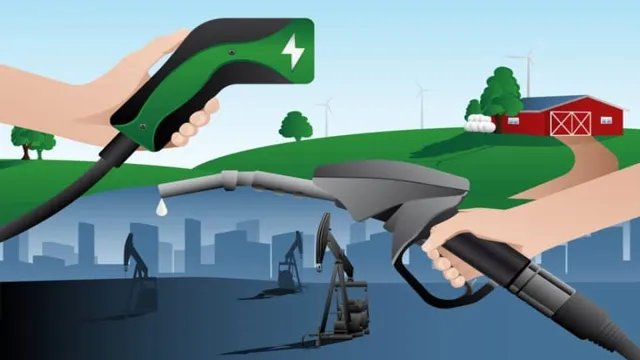The debate between electric cars and gasoline cars has been ongoing for years, and it’s only getting more heated as technology advances. While electric cars offer many advantages such as lower emissions and reduced fuel costs, they are also more expensive upfront when compared to their gas-powered counterparts. So how much do electric cars really cost compared to gasoline cars? This article will explore the advantages and disadvantages of electric cars, and compare the cost of owning one versus a gasoline car.
By the end, you’ll have a better understanding of which type of car could be the better choice for you.
Electric Cars vs. Gasoline Cars: Overview
The debate between electric cars and gasoline cars has been ongoing for a long time. Both have their advantages and disadvantages, but one of the biggest issues people consider when deciding between the two is cost. So, how does the cost of an electric car compare to a gasoline car? To start, electric cars are generally more expensive than gasoline cars.
One of the main reasons for this is that electric cars require a larger battery, which is a much more expensive component than a gas tank. In addition, electric cars require more complex charging and monitoring systems to ensure that they are running properly and safely. This adds to the cost of an electric car.
The good news is that electric cars often have higher resale value, so they can be a better investment than their gasoline counterparts. Additionally, electric cars can save you money in the long run as they don’t require costly oil changes, tune-ups, and fuel. The cost of electricity needed to charge an electric car is also much lower than the cost of gasoline.
On average, the cost of electricity is only about one-fourth of the cost of gasoline, so you can save a lot of money in the long run by using an electric car. It’s also important to consider the overall cost of ownership when comparing electric cars and gasoline cars. Electric cars require less maintenance and won’t need costly repairs like gasoline cars do.
This can help you save money in the long run, even if the initial cost of the car is higher. Overall, electric cars are typically more expensive than gasoline cars, but they can offer greater savings in the long run. They also require less maintenance and may have a higher resale value, so they can be a better investment than their gasoline counterparts.
Ultimately, it’s up to you to decide which type of car best fits your lifestyle and budget.
Pros & Cons of Electric Cars
Electric cars have been gaining popularity over the last few years as an eco-friendly option for transportation. But how does the cost of an electric car compare to a gasoline car? While the upfront cost of an electric car is often higher, there are many benefits that can make up for the difference. Let’s take a look at the pros and cons of electric cars to help you decide if it’s worth the investment.
The biggest advantage of electric cars is their low cost of operation. They only require electricity to power the motor, which is much cheaper than gasoline. Additionally, electric cars require much less maintenance than gasoline cars, so you will save money on repairs and inspections.
Another benefit of electric cars is that they produce zero emissions. This is beneficial for the environment, as it helps reduce air pollution. Not only that, but electric cars are also quieter than gasoline cars, making them a great choice for those who live in densely populated areas.
On the downside, electric cars have a much shorter range than gasoline cars. They can typically only travel around 100 miles on a single charge, while gasoline cars can travel up to 500 miles. Additionally, electric cars take much longer to charge than gasoline cars take to fill up.
Overall, electric cars offer many benefits, but they are not for everyone. If you are looking for a reliable, eco-friendly option for transportation, they may be worth the investment. However, if you are looking for a car that can travel long distances, a gasoline car may be a better choice.

Pros & Cons of Gasoline Cars
The cost of owning and running an electric car compared to a gasoline car is one of the most important factors to consider when making a purchase. While electric cars may be more expensive upfront, they often end up costing less in the long run. Electric cars require little to no maintenance, meaning fewer trips to the mechanic.
Electric cars also cost much less to fuel up, as electricity is significantly less expensive than gasoline. Additionally, electric cars tend to have lower insurance premiums than gasoline cars. On the other hand, gasoline cars are typically cheaper to buy upfront and may be more suitable for longer trips since they can be refueled in minutes.
Ultimately, it’s important to weigh the pros and cons of both types of cars to determine which is the best fit for your lifestyle and budget.
Cost Comparison of Electric vs. Gasoline Cars
Electric cars are becoming more and more popular as people seek out more fuel-efficient and eco-friendly transportation options. But with the increased popularity, the question arises: how does the cost of an electric car compare to a gasoline car? The cost of an electric car is generally higher than a gasoline car. This is because electric cars have a higher up-front cost due to the cost of the battery and other components.
Plus, you will likely need to pay for the installation of a charging station. The cost of electricity also needs to be factored in, as it will cost more than gasoline to charge the car. On the other hand, electric cars have a much lower cost of ownership.
This is because they don’t require as much maintenance as gasoline cars, and their batteries are designed to last much longer. Additionally, electric cars can get a much better fuel economy, meaning you can save money on fuel costs over the long run. Furthermore, electric cars may be eligible for government incentives that can help offset the cost of purchasing one.
This includes federal tax credits, state tax credits, and other incentives such as access to high-occupancy vehicle lanes and free parking. Overall, electric cars are more expensive up-front, but the cost of ownership is often lower due to lower fuel and maintenance costs. The cost savings associated with electric cars can be significant over the long run, and government incentives can help to make up the difference.
If you’re looking for an environmentally-friendly and cost-effective way to get around, an electric car may be the right choice for you.
Initial Cost
The cost of an electric car versus a gasoline car is an important factor to consider when making the switch to electric. Although electric cars initially cost more than their gasoline counterparts, the long-term savings in fuel and maintenance can easily outweigh the initial cost. Electric cars require significantly less maintenance than gasoline cars, meaning you’ll save on labor costs associated with oil changes and other maintenance.
Additionally, electric cars can be powered by renewable energy sources, which can help reduce your carbon footprint and save you money in the long run.
Fuel & Maintenance
It’s no secret that electric cars have become increasingly popular in recent years, especially among eco-conscious drivers. But how does the cost of an electric car compare to a gasoline car? Although electric cars may cost more upfront, they can be more cost-effective in the long run. Electric cars require less maintenance, as they have fewer moving parts than gasoline cars, and they offer savings on fuel costs.
Electric cars also typically offer incentives such as tax credits and rebates, as well as access to carpool lanes and other green initiatives. Ultimately, the cost of an electric car may depend on your driving habits and needs, but it’s worth considering the long-term savings that these vehicles may offer.
Tax Incentives & Subsidies
One of the most important questions to ask when considering purchasing an electric car is how much it will cost compared to a gasoline car. Considering the various tax incentives and subsidies available for electric vehicles, the cost of an electric car can be significantly lower than that of a gasoline car. Depending on the state, buyers may be eligible for thousands of dollars in tax credits, reduced registration fees, and even cash rebates.
Additionally, many utility companies offer discounts on electricity for electric vehicle owners. Ultimately, the cost savings of an electric car compared to a gasoline car can be remarkable.
Conclusion
The cost of owning an electric car versus a gasoline car is a complex matter. While electric cars may have a higher initial cost, they can provide significant savings in the long run through lower fuel and maintenance costs. Electric cars also offer the benefit of being more environmentally friendly with zero emissions.
Additionally, government incentives and subsidies for electric cars can help offset the initial cost. Ultimately, it’s important to carefully consider your own driving habits, budget, and priorities when deciding between an electric or gasoline car.
Frequently Asked Questions
Are electric cars more expensive to purchase than gasoline cars?
Generally, yes. Electric cars have a higher upfront cost due to the expensive battery and other components. However, they can offer long-term cost savings through lower fuel and maintenance costs.
Will I save money on fuel costs if I switch to an electric car?
Yes, electric cars can significantly save you money on fuel costs. The cost of electricity is generally much lower than gasoline, and electric cars have better fuel economy.
Do electric cars require less maintenance than gasoline cars?
Yes, electric cars require less maintenance than gasoline cars because they have fewer moving parts. This can lead to cost savings on repairs and maintenance.
Are there any government incentives for purchasing an electric car?
Yes, there are often government incentives available for electric car purchases. These include federal tax credits, state tax credits, and other incentives such as access to carpool lanes and free parking.
How does the resale value of electric cars compare to gasoline cars?
Electric cars often have a higher resale value than gasoline cars. This can make them a better investment in the long run, despite the higher upfront cost.
Can I charge my electric car at home?
Yes, you can charge your electric car at home. You will need to have a dedicated charging station installed, but once that is done, you can conveniently charge your car overnight or whenever it is parked at home.

I am James Beaupre, the founder of batteryvehicleprice.com. With a deep-rooted passion for vehicle batteries, I have dedicated my career to exploring and understanding the intricacies of this crucial technology. My website aims to provide valuable insights and information on battery-powered vehicles, empowering individuals to make informed decisions.
